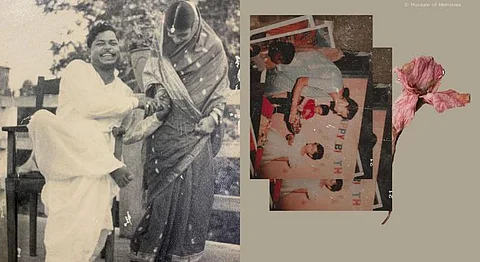
- #HGCREATORS
- #HGEXPLORE
- #HGVOICES
- #HGSHOP
- CAREERS
- ABOUT US
- CONTACT US

Reminiscing, or being nostalgic is next to an unexplainable feeling. Are we simply trying to visit the past, or attempting to relive them? Are our thoughts dictating to us a sequence of events that may have taken place some time ago, or are we reading our memories back to us?
Whatever it may be, it must be remembered that when we are reminded of the past, the lens is always gendered –– zoomed into male privilege and far away from the role of women in mapping the course. In fact, our rich history is not so rich when it comes to the contributions, trials, thoughts and experiences of women.
Our country, much like many others, has been exposed to history so gendered, that when the un-gendered version is presented, it seems almost false. Attempting to change this narrative is the platform Museum Of Memories as they narrate ‘untold stories of heritage through the lens of gender’. A Sandbox Collective initiative, Museum Of Memories has been made possible by a grant from the British Council –– it is curated by three passionate women, Aakriti Chandervanshi, Charulatha Dasappa and Mallika Dabke.
As of now, the platform consists of 12 story contributions that revolve around their experiences or generational inputs of heritage through a lens of gender. Each contribution as beautiful as the next, the span of these 12 stories is as nuanced as it gets –– it is personal, raw, real and hence, relatable.
In conversation with one of the curators, Charulatha, I was able to gather much more of what Museum Of Memories really aims to do, along with where India stands when it comes to the understanding of the role of gender in various aspects.
Charu says, “Women and gender minorities are largely erased from our history. However, in this age group (18-25), we are thinking a lot about our identities and how they are forming.”
When I spoke of inheritance and how it shapes us, Charulatha was quick to mention a term I feel is important to learn –– selective inheritance. She explained that we have a choice of what we want to inherit certain traits and that we get to choose our identity to an extent. Whether one opts to accept or reject something leads to their identity formation, as opposed to what was considered the norm –– to inherit the good and the bad, just as it was passed down with no questions.
Museum Of Memories is successful in conveying such a concept, and is here to prove that hereon, the history we leave behind must not be gendered –– it need not tilt in favour of a gender majority, and it certainly need not disallow one from choosing their identity.
Of the 12 contributors, I was fortunate enough to also indulge in an insightful conversation with Bidisha Mahapatra, author of ‘In The Lifetime Of A Hibiscus’ –– a view of Bidisha’s feminist outlook on her grandmother’s marriage at a young age, and her alteration in thought as she realises that her marriage, somehow, was her journey to independence.
“Sometimes we need to step into others’ shoes –– they might be tight-fitting shoes but we have to do it to understand them. People’s stories deserve to be told and heard. They deserve that empathy, and they deserve to be made safe in this journey,” says Bidisha.
Piecing together the 12 stores, we see a common thread of not women standing for women –– that’s a given. We see the deep desire to be able to retell history in a way that includes, provides and justifies the existence of identities more than one –– India is far from a land of homogeneity. One’s gender or identity is not a parameter to define their place in the present, past or future –– their place must be made automatically.
Through my conversations with these two young women, it is clear that the Museum Of Memories is not aiming at complex outcomes. It simply aims to create space –– space that may not have been rightfully given to gender minorities back in the day, but is ours to reclaim now.
The contributions are as follows:
‘The Curious Curio’ by Charvi Venkat
‘My Anxiety Has Its Ancestors’ by Gargi Upadhyay
‘In The Lifetime Of A Hibiscus’ by Bidisha Mahapatra
‘A Gender Investment’ by Neer Sihag
‘Blue And Grey’ by Apurva Korde
‘A Queer Inheritance: Borrowed & Stolen’ by Aditya Vikram
‘To Insanity’ by Dhruvi Modi
‘Fragments Of Memories’ by Surabhi
‘The Earth And Her Daugters’ by Maitreyee Mhatre
‘The Grandmother Theory’ by Geethika Nair
‘A Midsummer Nights Communion’ by Jose
‘Amma, And My Tamura’ by Lakshmi Ramesh
Visit the Museum Of Memories here.
If you enjoyed reading this, we suggest you also read:
